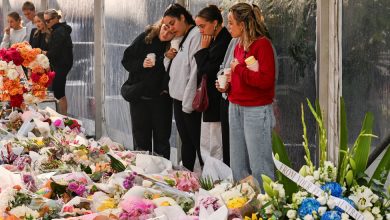Behind the Killings of Homeless Men, Portraits of 3 Lives Derailed

By the time Morgan Holmes and Gerald Brevard III crossed paths on a scrubby strip of highway behind an animal shelter in Washington, they had spent years following each other’s erratic footsteps, tracing zigzag paths through the courts and jails and mental hospitals of the nation’s capital and its suburbs.
They had done stints at the same city psychiatric institution and sometimes spent nights in the same neighborhood: Mr. Brevard at a men’s shelter, Mr. Holmes in a tent along the roadside.
Still, they had arrived at this place with different histories. Mr. Holmes, popular and full of promise as a young man, was a generation older at 54, and after a lifetime of attempts at stability, he had eventually withdrawn from his family, ashamed of his condition. Mr. Brevard, 30, often tormented by illusions that people were plotting against him, had been in and out of the criminal justice system his entire adult life.
In New York City, Abdoulaye Coulibaly had taken a separate route to the streets. Born in the West African nation of Gambia, he came to New York about 20 years ago and made a bare living selling knockoff pocketbooks and directing customers to street vendors on a sidewalk in Chinatown until he, too, fell prey to mental illness and homelessness.
The three men’s lives collided violently earlier this month, the authorities said. On March 9, after shooting and wounding two other homeless men, Mr. Brevard approached Mr. Holmes’s tent, shot and stabbed him and then set the tent aflame, prosecutors said.

Mr. Holmes was killed along New York Avenue Northeast in Washington.Credit…T.J. Kirkpatrick for The New York Times
Three nights later, Mr. Brevard surfaced in Manhattan, still apparently looking for targets. Ninety minutes after shooting a man in the arm, the police say, he came upon Mr. Coulibaly sleeping in a doorway next to an art supply store that was closed for the night. A volley of shots, and Mr. Coulibaly lay dead as well. Mr. Brevard was arrested three days later back in Washington and was charged with murder.
The spasms of bloodshed came as the two cities grappled with intertwined crises of homelessness and untreated mental illness that have grown more acute during the pandemic, and have also faced rising gun violence. But crises, even citywide ones, are made up of individual tragedies — and of families who are quietly enduring years of worry and pain.
‘Things just changed’
As a teenager in Philadelphia in the 1980s, Mr. Holmes was already making a name for himself: an honors student, a star basketball player, a talented musician, a regular on a TV dance show, “Dancin’ on Air.” He got letters from all over, from fans of his dancing and from eager college admissions offices, said his mother, Barbara Holmes, 74, a retired lab technician.
To pay for college, he enlisted in the Army; Ms. Holmes was resistant — he was her only child — but his future seemed wide open.
Among the drab barracks at Fort Stewart in rural Georgia, “he was so vibrant,” said Amanda Demouchet, 54, at the time a young soldier herself. They fell in love, got married and in 1989, when they were stationed in Germany, had a daughter, Kisa.
Just a year later, when they returned to Philadelphia, Mr. Holmes, then in his early 20s, began acting strangely.
“Things just changed — I couldn’t tell you what it was,” Ms. Demouchet said. It would be years before she learned of his mental illness.
Pregnant with a son, Ms. Demouchet took Kisa to her hometown in south Louisiana. Mr. Holmes followed for a brief time, then left. The next she heard, he was living in California.
Ms. Holmes tried to stay in touch with her son, though at that point, she said, “the schizophrenia was really kicking in.” He would fall silent for months, and then a long Mother’s Day letter would arrive, or he would call from a pay phone. Then he would disappear again.
One day, after years of silence, Mr. Holmes called his mother from a psychiatric hospital in Los Angeles. The hospital eventually placed him in a group home, and he was soon doing better than he had in years. He enrolled at a community college, sending his mother his dean’s list certificates. In 2002, he earned an associate degree in computer science and told his mother that he wanted to come home.
In Philadelphia, Mr. Holmes went on and off his medications. Some evenings his mother would come home from work to find the front door open and the house empty. Once she drove past him walking down the freeway. Another time, a police officer found him standing alone in a park, crying.
When the disappearances grew more routine, she took him to a group home nearby. Again, he improved, staying with her on weekends and spending time with his children, now teenagers.
Again, he left one day. Ms. Holmes would not see him for years.
“You’d look out there and it’s snowing,” she said. “Is my child in the snow? Is he cold? Is he sleeping under a bridge somewhere? Does he even realize that it’s cold out? You know, mentally, is he aware?”
About five years ago, Kisa’s fiancé hired a private investigator to look for her father. They found him at a state psychiatric hospital outside Baltimore; he had told people there that he had no family.
But Mr. Holmes was doing well enough that he eventually moved to a private apartment. He kept up with his medication, but its side effects sent his hands into wild tremors. He tried to play catch with Kisa’s young son, who asked why his grandfather seemed to be fighting with the air.
“I could tell he was embarrassed,” Kisa said. Mr. Holmes seemed painfully aware of the charismatic young man he had once been and the frailer person he had become. He kept running away, she said, because “he didn’t want his children and his family to see him in a lesser position.”
One day in 2017, Kisa, pregnant again, planned a visit to show Mr. Holmes the ultrasound of his granddaughter. When she and her mother called ahead, he was gone.
His next four years are cataloged, in part, in the records of the District of Columbia courts: stealing from a convenience store, hitting a pedestrian, going into a church to play the piano and then punching the person who told him to stop.
All this time, he had family in Philadelphia and even in Washington, wondering where he might be.
Drugs, and a litany of crimes
Gerald Brevard III was born in Germany while his father, Gerald Brevard Jr., was serving there in the Army. Stateside, in his teens, he drifted toward drugs.
“We lived in Southeast D.C.” — a part of the city scarred by high crime — “and he was starting to get into trouble, and I didn’t want him to be around that element,” his father said in an interview after Mr. Brevard’s arrest. They moved to the Maryland suburbs, but it didn’t help. “He did more drugs there than he did in D.C.”
Mr. Brevard’s mental health deteriorated. “His mind never came back,” his father said. Mr. Brevard followed in the footsteps of his father, an electrician, and became an apprentice electrician himself, but he never stayed out of trouble long.
His late teens and 20s brought a litany of charges across Maryland, Virginia and the District of Columbia: destroying property, armed robbery, sexual assault, credit card theft.
Sometimes he stayed at his great-aunt’s in Washington. Sometimes he lived on the street. “He would get new phones like people would change socks,” his father said.
In 2019, facing an assault charge, Mr. Brevard was found incompetent to stand trial and was sent for “competency restoration” to St. Elizabeths Hospital, a psychiatric center where Mr. Holmes had also spent time. He was discharged after a week, despite his father’s pleas that he be admitted for longer treatment.
Mr. Brevard’s father said he had later tried to get his son admitted to a different clinic, Washington Hospital Center, but was told that “he’s an adult, and I can’t have him committed.”
He added, “He didn’t want to be committed, but he wasn’t in his right mind.”
Mr. Brevard was released from his most recent jail stretch last July, just before he turned 30. A while later, he got a job at City Winery DC, an upscale restaurant and concert venue on the block behind the New York Avenue Men’s Emergency Shelter, where he was staying.
Another shelter resident, who gave his name only as Anthony, 50, knew Mr. Brevard by sight. One night this month, Anthony said, he and a friend were drinking in the alley behind the shelter, two blocks from Mr. Holmes’s tent, when they saw a man who looked like Mr. Brevard walk through, twice in a short span of time, with his face covered. “I said to myself, ‘Why is he covered up like that?’” Anthony said.
Later, he heard gunshots. Mr. Holmes’s burned body was discovered the next morning. Two days after that, prosecutors said, Mr. Brevard headed to New York.
‘Where he died — that’s his home’
In the polyglot open-air market in Lower Manhattan where Chinatown merges with SoHo and the streets bustle with tourists and hawkers of handbags and watches, Abdoulaye Coulibaly was as familiar as he was mysterious.
A fixture for nearly two decades, he stood at the corner of Canal and Lafayette Streets, directing customers to vendors, a job known as commissioning. He was the tall, handsome man with the broad smile and gentle demeanor who seldom talked much about his life.
“More than loved, this guy,” said Samba Ba, who works in a coffee shop in the area.
Mr. Coulibaly, who was around 50 — his family is not sure of his age — came to New York from Gambia in his 20s or early 30s, said a cousin, Bakary Camara. His mother and stepfather were already living in the Bronx, but Mr. Coulibaly declined to move in with them or any of his other relatives — unusual in a community where kinship is everything.
“From the very inception of his arrival here, he never really came and joined the family,” Mr. Camara said.
Instead, Mr. Coulibaly rented a room in an apartment where Senegalese street vendors were living and went to work for them downtown, Mr. Camara said.
About five years ago, Mr. Camara said, Mr. Coulibaly’s younger brother and stepbrother, who had moved to Ohio, came to New York to try to persuade him to return with them. He refused.
“You cannot force your elder brother to do anything,” Mr. Camara said. “You’re supposed to be following him, not him following you.” The siblings returned to Ohio without him.
To his friends on the street, though, Mr. Coulibaly said he felt stuck: He said he missed Gambia but could not go back because he had no papers.
A few years ago, Mr. Coulibaly’s friends said, he changed, seemingly overnight. “He lost his mind, became dysfunctional,” said Moumouni Karamdirr, a shelter resident who knew Mr. Coulibaly from the homeless community in the area.
Mr. Coulibaly stopped working, but he never left his corner of Chinatown. “Where he died — that’s his home,” Mr. Ba said. “He don’t know nowhere in this country, only there.”
Even homeless and jobless, Mr. Coulibaly did not ask for help. Old friends offered money or meals, coffee or a warm coat. Usually, he declined.
Just before sunrise on March 12, Abed Campos, a homeless man who slept just down the block from Mr. Coulibaly, heard noises. He went back to sleep.
In the morning, “I looked at the guy next to me,” said Mr. Campos, 50. Mr. Coulibaly was usually up and about by 9 a.m. He lay still.
Eleven a.m. came and went. It began to snow. At 2, Mr. Campos spoke to Mr. Coulibaly — no response. “I said, ‘Ahh, he’s tired.’ I gave him an extra two hours. By 4:30, I had to touch him a little bit.”
Mr. Coulibaly’s body was stiff.
More than a week after his death and days after Mr. Brevard’s arrest, Mr. Coulibaly’s family has been unable to claim his body because they cannot provide the police with proof of his birth date, Mr. Camara said.
The last time anyone in Mr. Coulibaly’s family saw him alive was about a year and a half ago.
His mother came to town from Ohio to visit her family, Mr. Camara said. As she always did, she stopped by Canal Street and went to a shop owned by a Gambian man, who took her to see her oldest son.
As Mr. Holmes’s mother had done so many times, Abdoulaye Coulibaly’s mother begged him to come home.
“She told him she wants him to come with her,” Mr. Camara said. “And he said no, that he’s OK where he’s at. And she left.”
Chris Cameron contributed reporting from Washington. Susan C. Beachy and Sheelagh McNeill contributed research.




